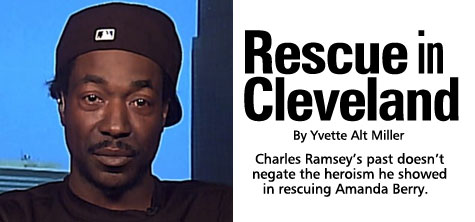 Vampire Weekend's Surprising Jewish Stories
Vampire Weekend's Surprising Jewish Stories


5 min read
Charles Ramsey’s past doesn’t negate the heroism he showed in rescuing Amanda Berry.
When Charles Ramsey heard a woman screaming at his neighbor’s house, he later said the sound was so loud children stopped playing nearby. As neighbors resumed their business, ignoring the sound, Mr. Ramsey crossed the street to investigate the screams coming from his friend’s house.
He found Amanda Berry, missing for ten years, frantically trying to open the front door which had been chained shut. The door opened wide enough only for her hand to get out, and Mr. Ramsey – realizing the seriousness of the situation – helped Ms. Berry by kicking a hole in the bottom half of the door.
“So I did what I had to do.” Charles Ramsey
Ms. Berry emerged from a decade in captivity, along with her daughter, and quickly borrowed a phone to call 911. Charles Ramsey called on his own phone too, and – insisting to a skeptical dispatcher that this was not a hoax – reported that a crime had taken place. When the police arrived, they freed two other hostages, Gina DeJesus and Michelle Knight, from the house too.
Mr. Ramsey was immediately hailed as a “hero”. His actions seemed to embody the best in humanity, to exemplify the energy and caring that we all hope we are capable of in our dreams. His valor echoes the timeless moral injunction of the Torah never to refrain when we see another person in danger: “Do not stand idly by when your fellow man’s life is in danger” (Leviticus 19:16).
On one level, this everlasting moral principle seems obvious: who amongst us wouldn’t want to rush to the aid of another human being? Yet the situation at 2207 Seymour Avenue shows us how very hard it can be to help, how difficult it can be to translate this lofty sentiment into concrete actions. Who amongst us hasn’t thought that, given the right circumstances, we would be capable of heroism?
Yet, in this case, it wasn’t easy even for concerned neighbors to rise to the occasion and help.
There were times the women could have been aided. In 2004, police visited Ariel Castro, the home’s owner, after he left a boy unattended on the school bus he drove. But it appears the police didn’t actually enter the house, and left never realizing three women were being kept captive inside.
Three years ago, neighbors living two doors away heard a blood-curdling shriek come from the basement. “It was the kind of scream that made you uncomfortable, so my mom called the police,” explained the neighbor, Juan Perez recently, but it appears the police didn’t investigate, and neither Mr. Perez nor his mother followed up.
Last year, a little girl saw an undressed woman crawling out of Castro’s house. The girl’s grandmother called the police. But they never came, and this neighbor apparently never followed up on her call.
Neighbors were moved to make an initial call for help, (I wonder how many of us would have turned a blind eye) but a greater commitment seemed to be needed in order call the police back and make sure they visited the house and found an explanation for the concerning behaviors they reported.
When we truly care about others, we won’t rest until we’re successful.
The great Jewish sage Rashi provides us with a deeper meaning to the Torah’s instruction not to stand idly by when others are in danger. It means identifying with our fellow human beings, caring about them and not talking ill about them or seeking to harm them. In explaining this commandment, he quotes Rabbi Akiva, who said “Love your fellow as yourself: this is the greatest mitzvah in the Torah.”
When we truly care about other people, we’ll seek to help them. Not half-heartedly, but fully, completely, aggressively. How many of us would be satisfied with merely calling the police if we suspected it was our friend, our neighbor, our sister, God forbid, who was held in that house? How many of us would have let the matter drop after one phone call, one unanswered appeal to the police? When we truly care about others, we won’t rest until we’re successful.
In his many colorful interviews since the women’s rescue, when asked if he thought he was a hero, Charles Ramsey demurred: “I’m an American and a human being. I’m just like you,” he said. It soon emerged that he wasn’t “just like” most people, however, and has been convicted of multiple crimes in his past, including domestic battery, drug abuse, criminal trespassing, and trespassing. He beat his wife and failed to pay child support for his daughter.
Ramsey must have known – given his new-found fame – that his criminal past would soon come to light. Perhaps that’s why he insisted so strongly that he was ordinary and typical, why he was so emotional in condemning the evil captivity on his block. Perhaps that’s why he turned down any offer of a reward, insisting instead that any money should go to the three women he helped free.
Does his sordid past negate his heroism on Seymour Avenue? In Jewish thought, we’re each responsible for our actions: the things we do define us. While Ramsey has plenty in his past to regret and repent for, they don’t negate the heroism he showed in helping rescue Amanda Berry.
His past misdeeds are separate from his actions. “There was a woman in distress, so why turn your back on that?” he told interviewers. Despite the fact that in his past Charles Ramsey turned his back on others, despite the fact he caused others distress, on that one day in Seymour Avenue, he acted. On that day, Charles Ramsey rose to the challenges he faced and was the man he had the potential to be.
